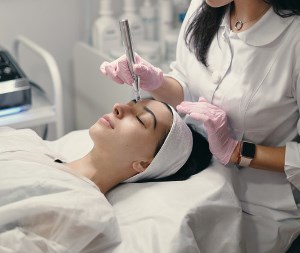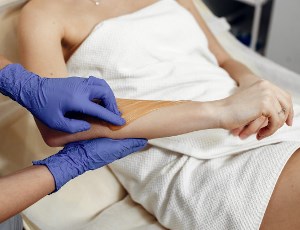How to Find the Best Esthetician College Near Boston Massachusetts
 Once you have decided to enter the field of cosmetology and attend an esthetician school near Boston MA, the process starts to find and enroll in the best program. It's important that the school you pick not only furnishes the necessary training for the specialty you have decided on, but also readies you for passing the licensing examination. When you begin your preliminary search, you may be a little bit puzzled about the difference between beauty schools and cosmetology schools. Well don't be, because the names are basically interchangeable and both relate to the same kind of school. If you intend on commuting to classes you will need to locate a school that is within driving distance of your Boston home. Tuition will also be a critical factor when reviewing prospective schools. Just keep in mind that because a school is the closest or the cheapest it's not automatically the right choice. There are several other qualifications that you should evaluate when comparing schools, such as their reputation and accreditation. We will examine what questions you should ask regarding the aesthetician schools you are considering later within this article. Before we do, let's talk a bit about what kinds of programs are available.
Once you have decided to enter the field of cosmetology and attend an esthetician school near Boston MA, the process starts to find and enroll in the best program. It's important that the school you pick not only furnishes the necessary training for the specialty you have decided on, but also readies you for passing the licensing examination. When you begin your preliminary search, you may be a little bit puzzled about the difference between beauty schools and cosmetology schools. Well don't be, because the names are basically interchangeable and both relate to the same kind of school. If you intend on commuting to classes you will need to locate a school that is within driving distance of your Boston home. Tuition will also be a critical factor when reviewing prospective schools. Just keep in mind that because a school is the closest or the cheapest it's not automatically the right choice. There are several other qualifications that you should evaluate when comparing schools, such as their reputation and accreditation. We will examine what questions you should ask regarding the aesthetician schools you are considering later within this article. Before we do, let's talk a bit about what kinds of programs are available.
It Takes Just a Few Minutes to Start Your Esthetician Career Below!
Esthetician Training Requirements
 Estheticians are highly trained, in-demand skincare experts, which is why an esthetics program requires around 600 hours of hands-on training hours. For licensure, you need to demonstrate a thorough understanding of the skin and the technology used in advanced treatments like lasers, LED lights, oxygen, or ultrasonic waves. Keep in mind that program requirements can vary by state, but most states require at least 600 hours of training to obtain a license in the field. In addition to training, estheticians should also have a professional and friendly personality that instills confidence in their clients. A skilled esthetician must be able to listen and empathize with their clients’ needs and concerns, often personalizing treatment for them.
Estheticians are highly trained, in-demand skincare experts, which is why an esthetics program requires around 600 hours of hands-on training hours. For licensure, you need to demonstrate a thorough understanding of the skin and the technology used in advanced treatments like lasers, LED lights, oxygen, or ultrasonic waves. Keep in mind that program requirements can vary by state, but most states require at least 600 hours of training to obtain a license in the field. In addition to training, estheticians should also have a professional and friendly personality that instills confidence in their clients. A skilled esthetician must be able to listen and empathize with their clients’ needs and concerns, often personalizing treatment for them.
Esthetician Job Description
An esthetician is a professional skin specialist who identifies cosmetic issues (such as wrinkles, pigmentation, or blemishes) and applies treatments to improve their condition. Most estheticians perform skin treatments like facials, superficial chemical peels, body treatments, skin conditioning, and blemish extraction, but they may also do waxing, lash extensions, and makeovers. Estheticians, unlike licensed cosmetologists, are also able to provide advanced treatments like microdermabrasion, chemical peels, light therapy, and hair removal. They may also educate clients on products, skincare regimens, and the benefits of esthetic procedures. Medical estheticians in clinical settings may help people identify and recover from health issues affecting the skin, such as working with cancer patients or burn victims after surgical procedures. Typically an esthetician works with a client in a spa or salon setting. Some estheticians work in a medical setting to complement medical services, such as in a dermatologist’s office, but they are not medical professionals. Estheticians may also work in locations as varied as Boston Massachusetts nursing facilities, luxury resorts, dermatologist offices or hospitals.
Online Esthetician Programs
 Online esthetician schools are convenient for Boston MA students who are working full time and have family obligations that make it challenging to enroll in a more traditional school. There are many online beauty school programs available that can be attended through a desktop computer or laptop at the student's convenience. More traditional beauty programs are often fast paced given that many courses are as short as six or eight months. This means that a considerable portion of time is spent in the classroom. With online courses, you are dealing with the same volume of material, but you are not spending numerous hours away from your home or commuting back and forth from classes. On the other hand, it's imperative that the school you select can provide internship training in nearby salons and parlors in order that you also get the hands-on training necessary for a complete education. Without the internship portion of the training, it's impossible to obtain the skills necessary to work in any facet of the cosmetology field. So be sure if you decide to enroll in an online program to verify that internship training is provided in your area.
Online esthetician schools are convenient for Boston MA students who are working full time and have family obligations that make it challenging to enroll in a more traditional school. There are many online beauty school programs available that can be attended through a desktop computer or laptop at the student's convenience. More traditional beauty programs are often fast paced given that many courses are as short as six or eight months. This means that a considerable portion of time is spent in the classroom. With online courses, you are dealing with the same volume of material, but you are not spending numerous hours away from your home or commuting back and forth from classes. On the other hand, it's imperative that the school you select can provide internship training in nearby salons and parlors in order that you also get the hands-on training necessary for a complete education. Without the internship portion of the training, it's impossible to obtain the skills necessary to work in any facet of the cosmetology field. So be sure if you decide to enroll in an online program to verify that internship training is provided in your area.
What to Ask Esthetics Training Classes
Below is a series of questions that you should investigate for any esthetician training school you are contemplating. As we have already discussed, the location of the school relative to your Boston home, as well as the price of tuition, will probably be your first qualifiers. Whether you would like to pursue a certificate, diploma or a degree will no doubt be next on your list. But once you have reduced your school options based on those initial qualifications, there are even more factors that you need to research and consider before enrolling in a cosmetology program. Below we have collected some of those supplemental questions that you should ask every school before making a final decision.
Is the Esthetician School Accredited? It's essential to make certain that the esthetician training program you pick is accredited. The accreditation should be by a U.S. Department of Education certified local or national agency, such as the National Accrediting Commission for Cosmetology Arts & Sciences (NACCAS). Schools accredited by the NACCAS must measure up to their high standards guaranteeing a quality curriculum and education. Accreditation may also be essential for obtaining student loans or financial aid, which often are not obtainable for non- accredited schools. It's also a prerequisite for licensing in many states that the training be accredited. And as a final benefit, a number of Boston MA employers will not employ recent graduates of non-accredited schools, or might look more positively upon those with accredited training.
Does the School have a Great Reputation? Any esthetician school that you are seriously considering should have a good to excellent reputation within the industry. Being accredited is a good starting point. Next, ask the schools for testimonials from their network of businesses where they have referred their students. Verify that the schools have high job placement rates, signifying that their students are highly sought after. Visit rating services for reviews as well as the school's accrediting organizations. If you have any relationships with Boston MA salon owners or managers, or someone working in the business, ask them if they are acquainted with the schools you are considering. They might even be able to recommend others that you had not thought of. And finally, contact the Massachusetts school licensing authority to find out if there have been any complaints submitted or if the schools are in full compliance.
What’s the School’s Specialty? Some esthetician schools offer programs that are broad in nature, concentrating on all areas of cosmetology. Others are more focused, providing training in a specific specialty, for instance hairstyling, manicuring or electrolysis. Schools that offer degree programs frequently expand into a management and marketing curriculum. So it's essential that you decide on a school that focuses on your area of interest. Since your objective is to be trained as an esthetician, make sure that the school you enroll in is accredited and respected for that program. If your vision is to launch a Boston MA beauty salon, then you need to enroll in a degree program that will instruct you how to be an owner/operator as well. Picking a highly rated school with a weak program in the specialty you are seeking will not deliver the training you require.
Is Any Live Training Provided? Learning and refining esthetician skills and techniques demands plenty of practice on volunteers. Find out how much live, hands-on training is furnished in the beauty lessons you will be attending. A number of schools have salons on campus that allow students to practice their developing talents on real people. If a beauty school offers limited or no scheduled live training, but instead relies mainly on the use of mannequins, it might not be the most effective option for developing your skills. So search for other schools that provide this type of training.
Does the School Provide Job Assistance? As soon as a student graduates from an esthetician school, it's important that she or he gets support in landing that first job. Job placement programs are an integral part of that process. Schools that offer assistance maintain relationships with Boston MA businesses that are looking for qualified graduates available for hiring. Verify that the schools you are contemplating have job placement programs and ask which salons and organizations they refer students to. Additionally, find out what their job placement rates are. High rates not only confirm that they have extensive networks of employers, but that their programs are highly respected as well.
Is Financial Aid Available? Many esthetician schools provide financial aid or student loan assistance for their students. Find out if the schools you are looking at have a financial aid office. Talk to a counselor and find out what student loans or grants you might qualify for. If the school is a member of the American Association of Cosmetology Schools (AACS), it will have scholarships available to students also. If a school fulfills each of your other qualifications except for expense, do not drop it as an option until you learn what financial help may be provided.
Find Out How to Become an Esthetician in Boston
Enroll in the Right Boston Esthetician Course
Selecting and enrolling in the ideal esthetician college is imperative to obtain the necessary training to become a licensed cosmetology specialist. Be sure to ask all the questions that you require so as to feel certain about your decision. Make certain to consolidate all of the responses you receive from the beauty school admissions departments, focus on what matters the most to you, and then employ that data to contrast schools. A good beginning in your due diligence procedure is to make certain that the institution and program you decide on are accredited and have outstanding reputations within the profession. If you start with that base, and address the additional questions presented in this article, you will be able to narrow down your list of schools so that you can make the proper choice. Once you graduate and pass your licensing test, you will be self-assured that you are qualified to start your new career as a professional esthetician in Boston Massachusetts.
Boston Esthetician Courses Online | Boston Esthetician Classes
